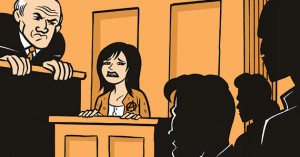The Stranger’s Brendan Kiley (featured here previously reporting the case of D.K. Pan) has an excellent article on the Seattle grand jury targeting anarchists.
Here’s an excerpt from “Political Convictions?:Â Federal Prosecutors in Seattle Are Dragging Activists into Grand Juries, Citing Their Social Circles and Anarchist Reading Materials“:
Journalist Will Potter, author of Green Is the New Red, who has written extensively about US law enforcement and its relationships with political dissidents from the 1990s onward, said such investigations don’t just incidentally chill free speech—in some cases, he believes, they’re trying to do that.
“Sometimes, law enforcement believes this knocking-down-the-door, boot-on-the-throat intimidation is part of a crime-prevention strategy,” he said. But a more pernicious goal may be social mapping. The anarchist books and cans of spray paint can be sexy items to wave around a courtroom, he said, but “address books, cell phones, hard drives—that’s the real gold.”
During the raid at her home, Plante said, some of the agents were initially hyperaggressive, but seemed “confused” by finding nothing more sinister than five sleepy young people. “It seemed like what they expected was some armed stronghold,” she said. “But it’s just a normal house, with normal stuff in the pantry, lots of cute animals, and everyone here was docile and polite.”
“That’s a really important point,” Potter said when I mentioned that detail. “There’s a huge disconnect between what the FBI and local police are being told and trained for, and what the reality is. There are presentations about ominous, nihilistic, black-clad, bomb-throwing, turn-of-the-century caricatures—the reality is that many anarchists are just organizing gathering spaces, free libraries, free neighborhood kitchens.”
He directed me to a 2011 PowerPoint presentation from the FBI’s “domestic terrorism operations unit”—posted on his blog—that described the current anarchist movement as “criminals seeking an ideology to justify their activities.” Following that logic, the very presence of anarchist literature could be construed as evidence that someone has motivations to commit a crime. And it makes attorneys, journalists, and others who care about First Amendment protections nervous about a law-enforcement practice that conflates political beliefs with criminal activity.
